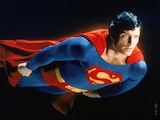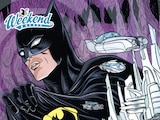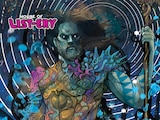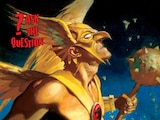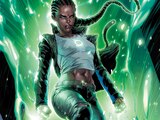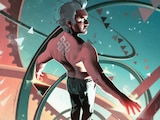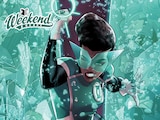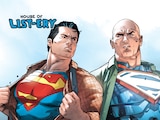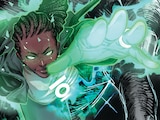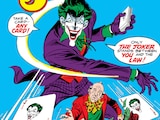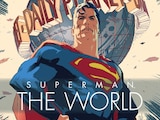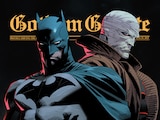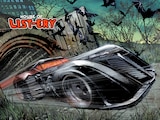When was the first time you read a comic by Dwayne McDuffie? For many kids of the late ’80s and early ’90s, McDuffie was synonymous with both of comics' biggest publishers. But it was during his time as a freelancer that he would eventually change the face of comics forever and would go on to shape the beloved and critically lauded DC Animated Universe.
Born in Detroit in 1962, McDuffie grew up reading science fiction stories and, of course, comic books. Yet, his love for the medium never stopped him from seeing the obvious issues that were present when it came to the way Black characters were brought to life. In a 1993 interview with The New York Times, McDuffie shared his memories of reading those stories.
"You only had two types of characters available for children,” he said. “You had the stupid angry brute and the he's-smart-but-he's-black characters. And they were all colored either this Hershey-bar shade of brown, a sickly looking gray, or purple. I've never seen anyone that's gray or purple before in my life. There was no diversity and almost no accuracy among the characters of color at all."
That was something McDuffie would change throughout his comics career, beginning at Marvel in 1987. His signature creation there was Damage Control, a comedic team take on the more banal parts of superhero lore. Four decades after their creation, a more militarized version of the crew was brought to the small screen in 2022. That was the kind of power that McDuffie's ideas had. Even years later, they can shape something as huge as Hollywood.
But it was the founding of Milestone Media that would arguably be McDuffie’s greatest legacy. In 1993, McDuffie along with Denys Cowan, Michael Davis and Derek T. Dingle founded the publisher that introduced heroes like Static, Hardware, Icon and the Blood Syndicate via a licensing deal with DC that would allow the team to have full creative control over their heroes while the company promoted and published their adventures under the Milestone imprint. It was a partnership that would evolve over the years and led to the Milestone characters becoming a part of the DC Universe in the 2010s before returning to their own “Dakotaverse” with the relaunch of Milestone in 2021.
The pages of your favorite comics weren't the only place that Milestone and McDuffie made waves, though. Bringing Virgil Hawkins to the screen in the beloved animated series Static Shock took the hero and his creators to a whole new level. People who'd never picked up a single issue suddenly knew the story of the hero known as Static. However, the show wasn't just a great introduction to Milestone's Dakota City and its flagship figure. Static Shock stands the test of time as McDuffie used the action-packed series to explore real-life issues like racism and bigotry through the lens of superhero storytelling. Its success set McDuffie on a new path which would reshape the DCU as we knew it, this time through more brilliant animation.
In the wake of Static Shock, McDuffie continued his quest to make great superhero TV. Next up was the 2001 Justice League animated series, which foreshadowed his return to comics years later. It was followed by Justice League Unlimited, on which McDuffie was a writer and producer, cementing his role as an animation heavy hitter. The JLU episodes McDuffie penned often presented complex moral questions to its heroes that belied the general belief that the only audience for such shows were children.
In 2007, McDuffie returned to DC Comics with a remarkable two-year run on Justice League of America (from issue #13) with artist Joe Benitez and Victor Llamas. It's one of the better modern arcs on the title and saw McDuffie showing off his talents as a thoughtful and incisive storyteller who is never afraid to have fun with the archetypal heroes he was playing with. Blending bombastic action with character arcs you actually care about, it was nothing short of a stellar return. McDuffie reimagined the team, adding Black Lightning and later Vixen to its roster. And the relationship between the former and Superman is one of the most intriguing parts of the series. You can read his entire run right now, and there's never been a better time.
Combining his comics writing skills and animation background, McDuffie went on to adapt multiple iconic DC comic books to animated film. Justice League: Crisis on Two Earths adapted an old Guy Gardner story along with Grant Morrison and Frank Quitely's JLA: Earth 2. He then took on another Morrison and Quitely book with All-Star Superman before turning his hand to Mark Waid and Howard Porter's JLA: Tower of Babel in Justice League: Doom. All three films played a part in cementing the DC’s animated movies as the animated superhero films to beat.
Though McDuffie died in 2011 at just 49, his influence and impact can still be felt through the DC / Milestone Universe and beyond. Your favorite comic book creators grew up reading McDuffie, which helped to shape their stories and style. The annual Dwayne McDuffie Award was created to celebrate comics that are committed to inclusive storytelling. The deal that the writer and his co-founders struck in 2010 for Milestone to become a part of the DC Universe is now more relevant than ever with heroes like Static and Hardware standing alongside Superman and Batman. And, of course, the Milestone Initiative continues his legacy introducing new talent like Aquaman writer Jordan Clark and Cyborg writer Morgan Hampton to the DC stable.
New to Dwayne McDuffie's comic book work? We have a great place to start. The DC Universe by Dwayne McDuffie is now available in bookstores, comic shops, libraries and as a digital graphic novel. Or if you're a DC UNIVERSE INFINITE subscriber, check out the Dwayne McDuffie collection for all of his comics in one convenient spot!
Rosie Knight is an award-winning journalist and author who loves Swamp Thing, the DC Cosmic and writing about those and more here at DC.com. You can listen to her waxing lyrical about comics, movies and more each week as she co-hosts Crooked Media's pop-culture podcast, X-Ray Vision.

